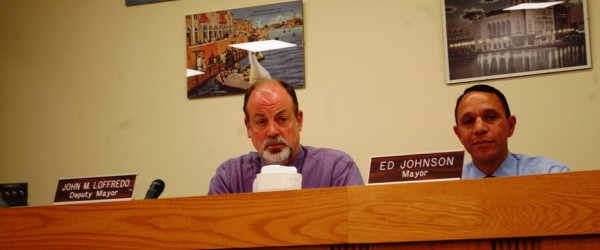City Council introduces charter study measure
Elected commission could propose scuttling structure of government in place since 1920s
Led by Councilman John Loffredo and Mayor Ed Johnson, both shown above, the city council introduced an ordinance last night to establish an elected commission to review the city’s form of government — with the power to submit changes to voters that would scuttle a system believed to date back to the 1920s.
“It’s time,” Loffredo immediately stated when the matter was brought up in the council’s workshop session. “Let’s do it,” Johnson added at the end of the discussion.
The council then proceeded in the regular meeting to introduce the ordinance by a vote of 5-0.
If the council approves the ordinance after a public hearing scheduled for May 2, voters in the November election would decide whether to establish a charter study commission, as well as elect its five members.
The commision could recommend a change to the city’s form of government to be approved by voters, or suggest no change.
The issue of the city’s form of government is a hotly contested one of late.
Political activist Duane Small – an outspoken critic of the incumbent council – has submitted a petition to the city clerk directly calling for a referendum to change the city’s form of government. The new form Small outlined in his petition would split the city into six wards, each with its own council member, as well as three more council members elected at large. The mayor would be directly elected, and would run the city.
Although Small’s petition contained the required 1610 valid signatures, representing one-quarter of the city’s registered voters, city attorney Frederick Raffetto rejected the petition on other legal grounds.
Raffetto said tonight that Small has 45 days from March 13 to appeal his decision.
Raffetto has previously told the Sun that if the council puts a charter study commission on the November ballot, it would stop any new direct petitions to ask voters to approve a specific new government form — the method Small attempted.
City voters currently elect all five council members every four years. The mayor is selected by the council, and presides over the meetings. The city manager is the city’s chief executive officer. Candidates run in a non-partisan election in May, with all candidates in one column on the ballot with no party affiliation.
A legal morass would result if Small does appeal the rejection of his previously-filed petition — after the Council has already authorized a charter study ballot question. A judge would have to sort out which question would go to the voters.
Click here to read a previous Sun story on the issue.







